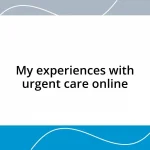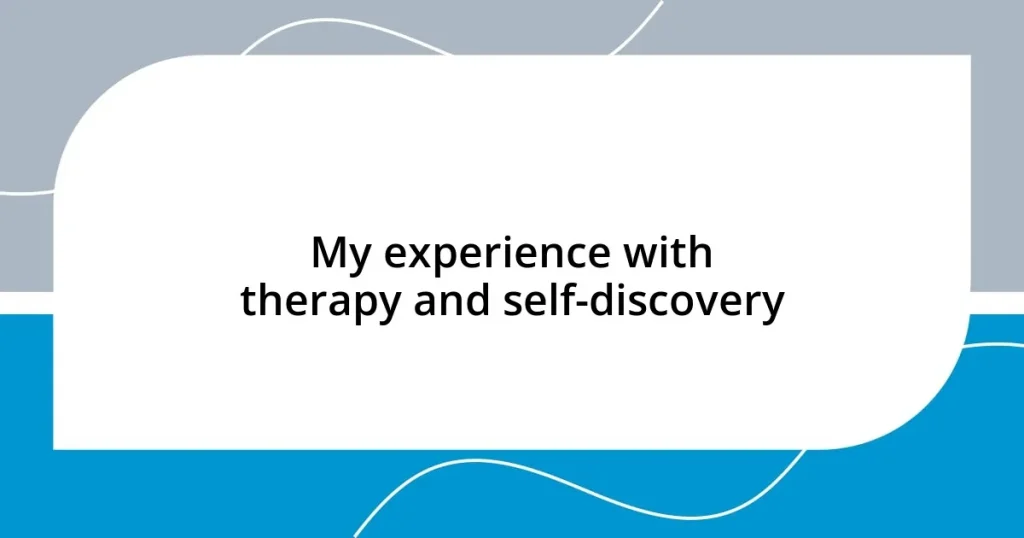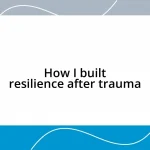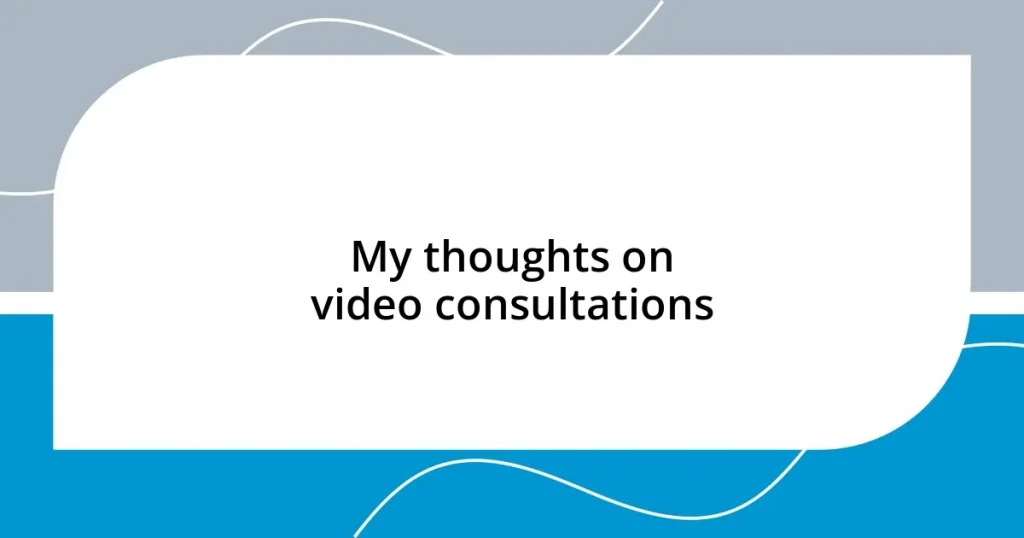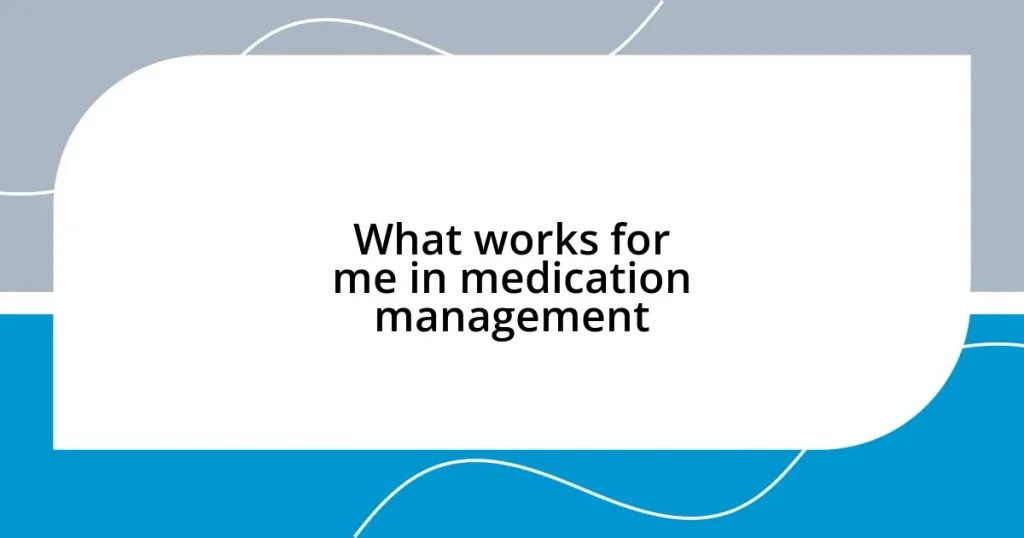Key takeaways:
- Therapy offers a safe space for vulnerability, facilitating self-discovery and empowerment.
- Journaling and guided imagery are effective tools for enhancing self-awareness during therapy.
- Building a support system, including friends and support groups, enriches the self-discovery journey.
- Continued self-reflection and self-care practices, like meditation and journaling, are crucial for maintaining growth post-therapy.
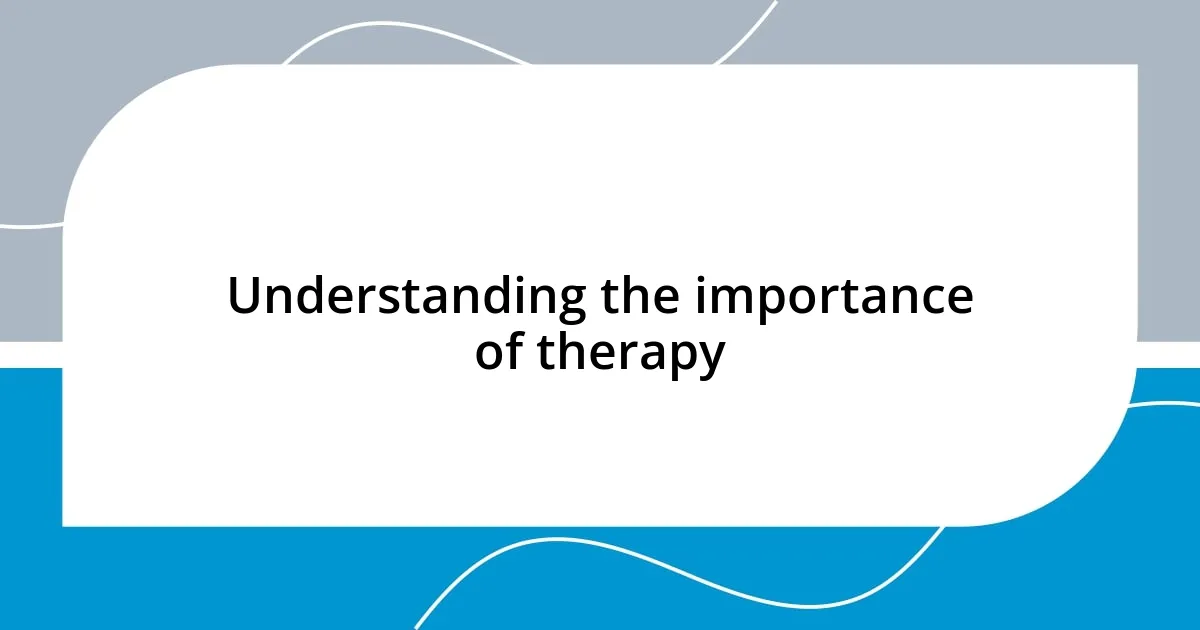
Understanding the importance of therapy
Therapy plays a crucial role in helping individuals navigate their inner landscapes. I remember sitting in my first session, feeling a mix of anxiety and hope as I realized that I wasn’t alone in my struggles. Isn’t it reassuring to know that there’s a professional out there who can guide you through the maze of your own thoughts and feelings?
One of the most profound aspects of therapy is the safe space it offers for vulnerability. I found myself sharing thoughts I had buried deep inside, and with each session, I uncovered layers of understanding about my own beliefs and behaviors. Have you ever felt like holding back your emotions was weighing you down? Therapy invites you to let go and truly explore what those feelings mean.
As I continued my journey, I discovered that therapy isn’t just about addressing problems; it’s also about self-growth and empowerment. There were moments when my therapist challenged me, pushing me out of my comfort zone. This led me to reflect: how often do we give ourselves permission to grow? Therapy teaches us that the discomfort of change can lead to incredible transformations.
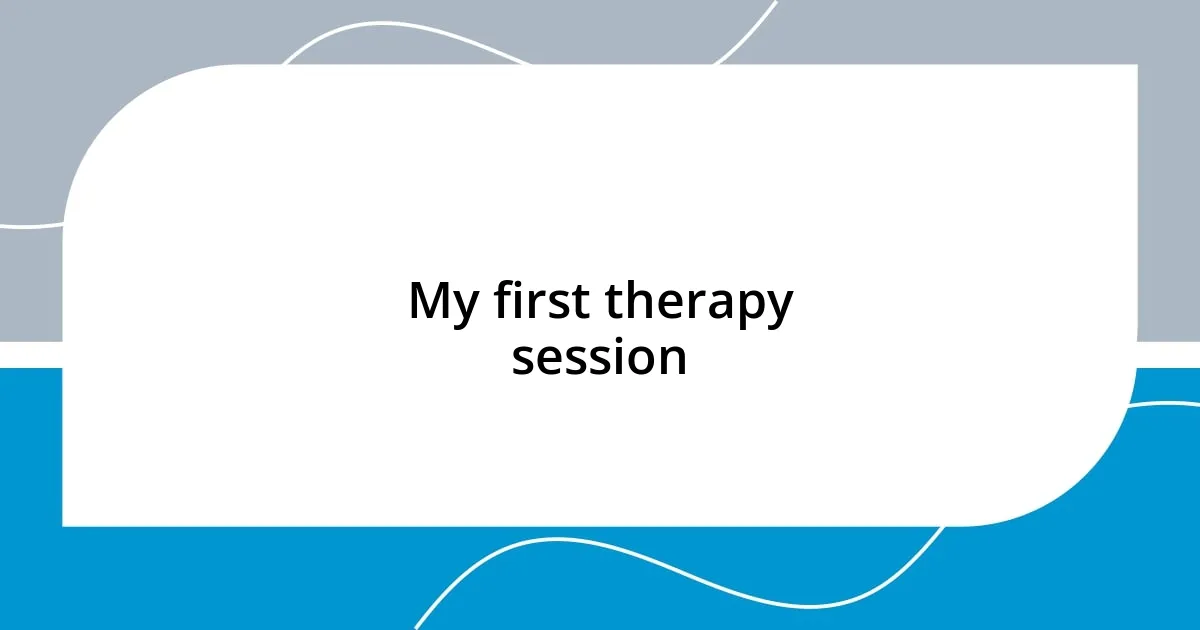
My first therapy session
I walked into my first therapy session with a flutter of nerves, wondering what I had gotten myself into. The room was warm and inviting, filled with soft hues and gentle lighting, creating an atmosphere that begged to be explored. When my therapist first asked how I felt, I hesitated, daunted by the enormity of my thoughts. Have you ever felt so overwhelmed that you couldn’t even begin to articulate what was bothering you? That was me, grappling with emotions I had long suppressed.
As our conversation unfolded, it was liberating to share my experiences, as if I was peeling away years of heavy layers. I remember recounting a moment from my past that had left a lasting impact. Surprisingly, my therapist helped me see it not just as a wound but as a lesson. Isn’t it fascinating how our perceptions can shift so dramatically when viewed from a different angle? I learned that feeling vulnerable is not a weakness; it’s a brave step towards understanding oneself.
The session wrapped up with a simple yet profound takeaway: it’s okay not to have all the answers. I left feeling lighter, as if I had offloaded some of my burdens. That initial meeting was a pivotal moment in my journey. It highlighted the importance of being open to exploring my inner world. Have you ever experienced that kind of emotional release? It’s an empowering feeling that I still cherish to this day.
| Highs | Lows |
|---|---|
| Feeling of vulnerability and safety | Anxiety about sharing personal thoughts |
| Lighthearted moments of insight | Fear of revisiting painful memories |
| Empowerment through self-discovery | Initial difficulty in articulating feelings |
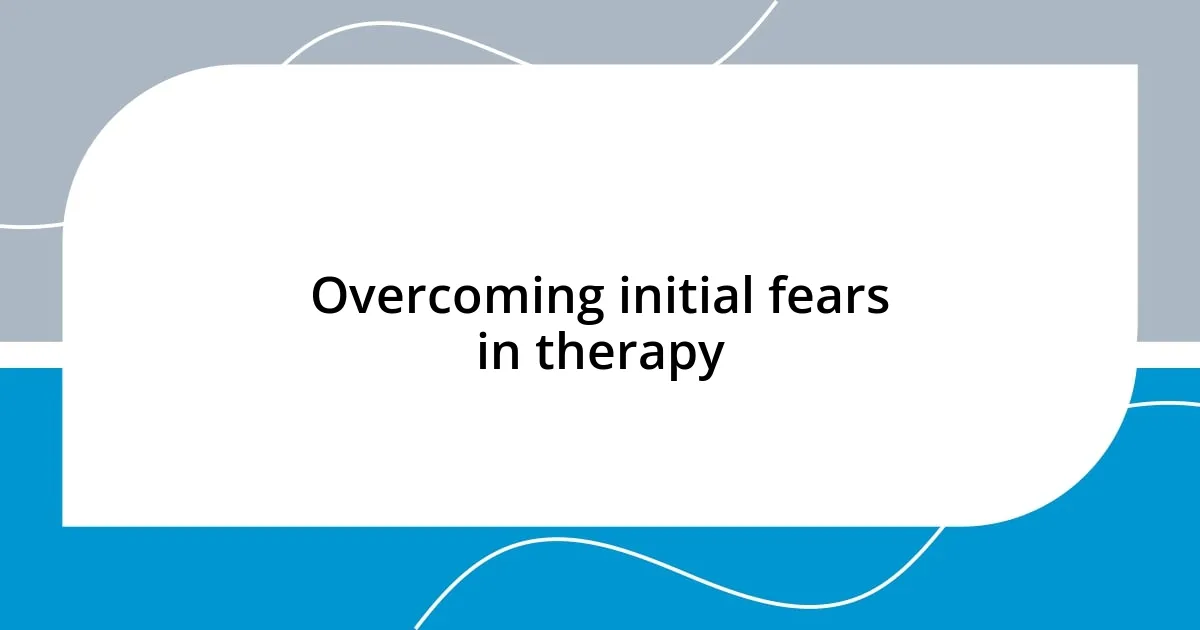
Overcoming initial fears in therapy
I remember my heart racing before each therapy session, the thought of opening up felt daunting. It was those initial fears that threatened to hold me back. But one day, I decided to embrace that discomfort. I shared my worries with my therapist, and to my surprise, she validated my feelings. It clicked for me in that moment: everyone feels nervous about vulnerability, and talking about it can actually ease the tension. By addressing my fears head-on, I took a huge step toward overcoming them.
When approaching therapy, it’s vital to acknowledge those initial fears. Here are some common anxieties and ways to navigate them:
- Fear of judgment: Remind yourself that therapists are trained to listen without judgment.
- Concerns about confidentiality: Understanding that what you share is kept private can alleviate worry.
- Anxiety over revisiting pain: Consider that facing tough emotions is part of healing and growth.
- Doubt about the process: Engage in open conversations with your therapist to clarify your thoughts.
- Apprehension of change: Embrace the idea that change takes time, and it’s okay to go at your own pace.
Recognizing and confronting these fears can be the first transformative steps on the path to self-discovery. Trust me, taking that leap of faith is worth it.
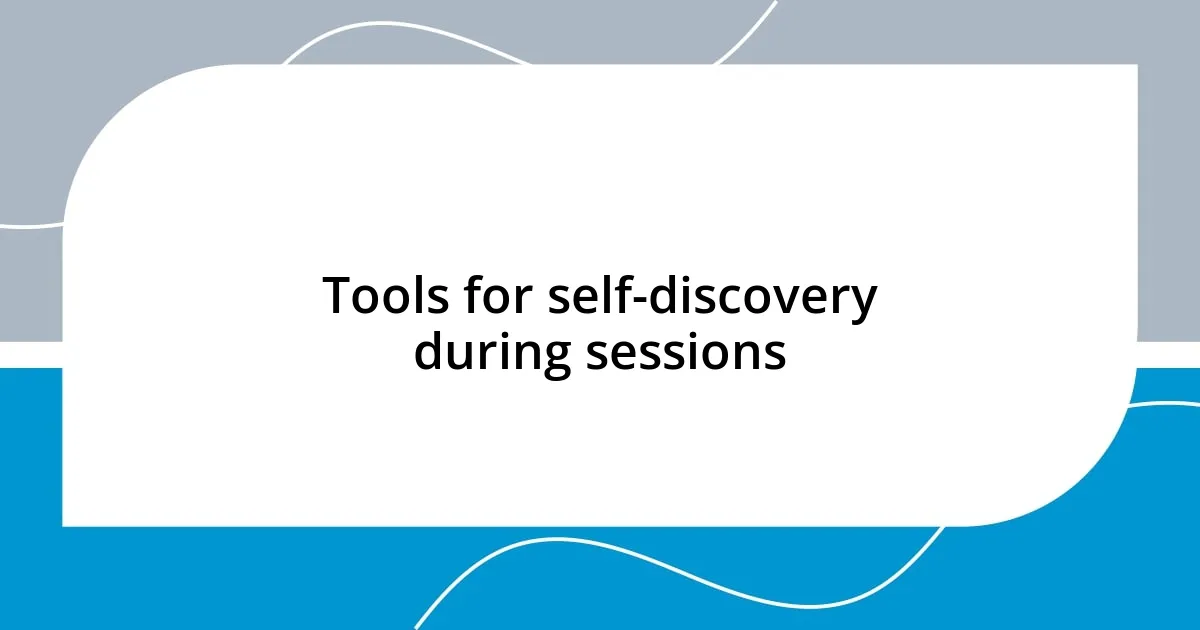
Tools for self-discovery during sessions
During my sessions, I discovered a couple of powerful tools for self-exploration that made a significant difference. Journaling became my go-to method. I remember asking my therapist how I could foster deeper self-awareness between our meetings. She encouraged me to write down my thoughts after each session. This simple practice allowed me to process emotions and insights more fully. Have you ever felt clarity when writing your thoughts down? It really amplified my understanding of my feelings and helped untangle complex thoughts.
Another invaluable tool I encountered was the use of guided imagery. I was skeptical at first; it sounded a bit too “out there” for my taste. However, when my therapist led me through a visualization exercise, I found myself transported to a calm beach where I felt completely safe. In that serene space, I could confront emotions I had been avoiding. It was a revelation! This practice opened a window to parts of myself I hadn’t even recognized were impacting my reality.
Lastly, I often engaged in cognitive restructuring exercises. These techniques involved challenging my negative thoughts. For instance, I vividly remember a moment when I caught myself spiraling into a cycle of self-doubt. My therapist guided me to identify those thoughts and reframe them into something more positive. It felt empowering to take control of my narrative rather than letting negativity dictate my mind. Have you tried altering how you perceive your inner dialogue? It’s a small shift that can lead to profound insights and lasting change.
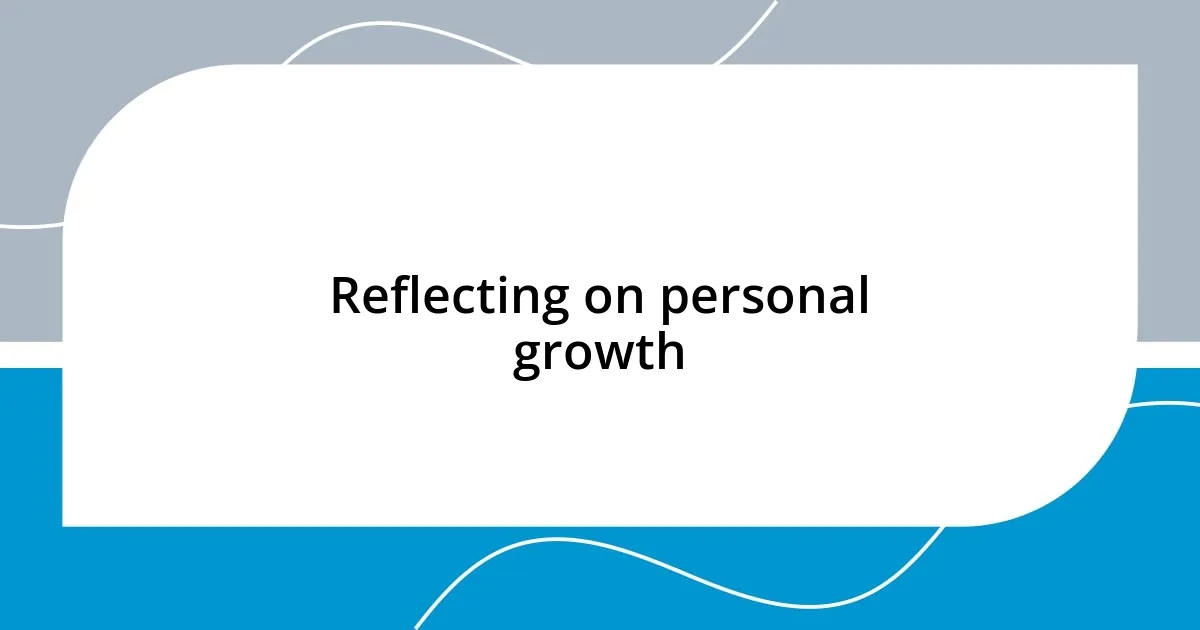
Reflecting on personal growth
Reflecting on personal growth is a powerful and often rewarding experience. I recall one particular evening when I took time to review my journey after several months of therapy. Sitting on my couch with a warm cup of tea, I felt that familiar mix of pride and disbelief wash over me. I had navigated through some pretty tough emotions, and, looking back, I could see how far I had come. Isn’t it fascinating how stepping back to observe your life can reveal patterns and progress you might miss in the daily grind?
Another poignant moment in my reflection came when I realized the importance of celebrating small victories. I remember a week when I had communicated openly with friends about my feelings of anxiety, something I had previously struggled to do. It felt like a victory, and acknowledging that achievement—no matter how small—was a breakthrough in my journey. Have you ever noticed how these little wins build momentum toward larger changes? I found that recognizing these moments not only boosts your confidence but also reinforces the habit of growth.
The more I embraced this reflection process, the clearer my values and aspirations became. There was a time when I was unsure about what I truly wanted in life. But regularly assessing my thoughts and feelings allowed me to articulate my goals, from personal relationships to career aspirations. It’s exhilarating when, through reflection, you discover what genuinely resonates with you. Have you taken the time to really listen to yourself? Trust me, the insights gained can be profoundly transformative and clarifying.
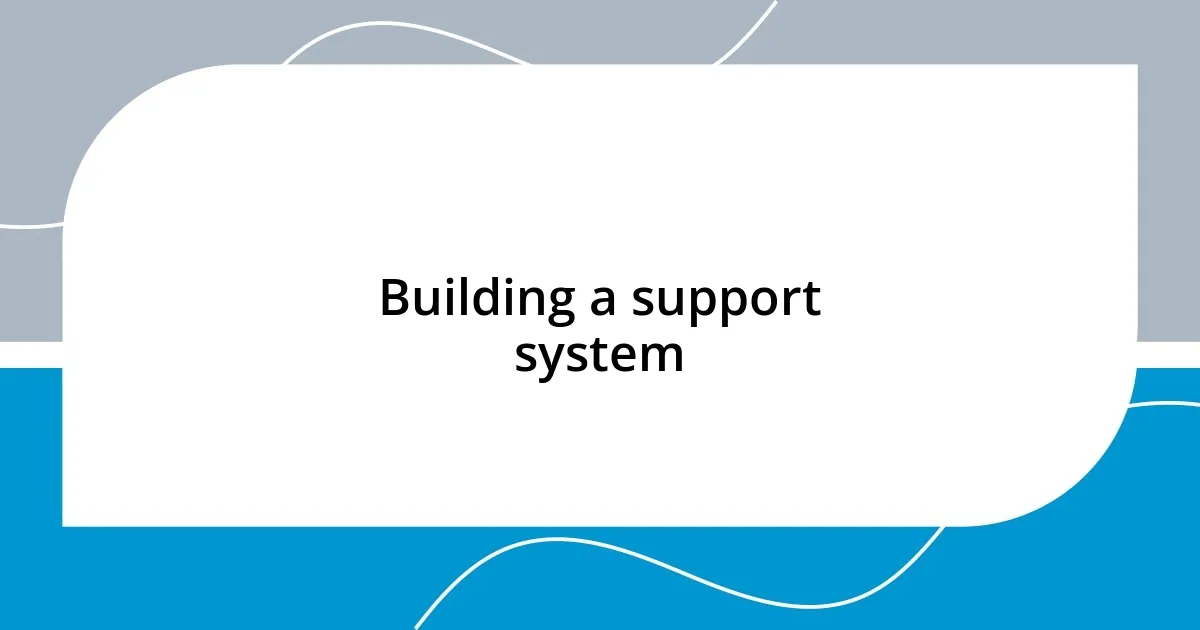
Building a support system
Building a support system is an essential part of any self-discovery journey. I remember when I first realized I needed more than just a therapist to lean on. I began reaching out to friends and family, sharing my experiences and inviting them into my world. It was incredible to witness the outpouring of love and understanding from those I cared about. Have you ever felt the warmth of a friend’s words lift you during tough times? That warmth can be a game changer.
Another key moment came when I joined a support group. Initially, I was hesitant; the idea of sharing my feelings with strangers felt daunting. But as we gathered, I found comfort in knowing others shared similar struggles. Their stories resonated with mine, and I felt a weight lift off my shoulders. It was a safe space where vulnerability thrived. I learned that building a support system isn’t just about receiving help; it’s also about giving it. Have you experienced a moment where sharing your story resonated deeply with someone else? It’s in those exchanges that we realize we’re never truly alone.
As I nurtured these connections, I started noticing a shift in my perspective. I became more open, and my support network encouraged me to explore my interests and passions freely. I distinctly recall a weekend spent hiking with friends who shared my love for nature. In those moments of laughter and camaraderie, I discovered parts of myself that had long been buried beneath self-doubt. How can tapping into shared experiences with others lead to profound self-discoveries? For me, it ignited a sense of belonging that fueled my growth and made the journey richer.
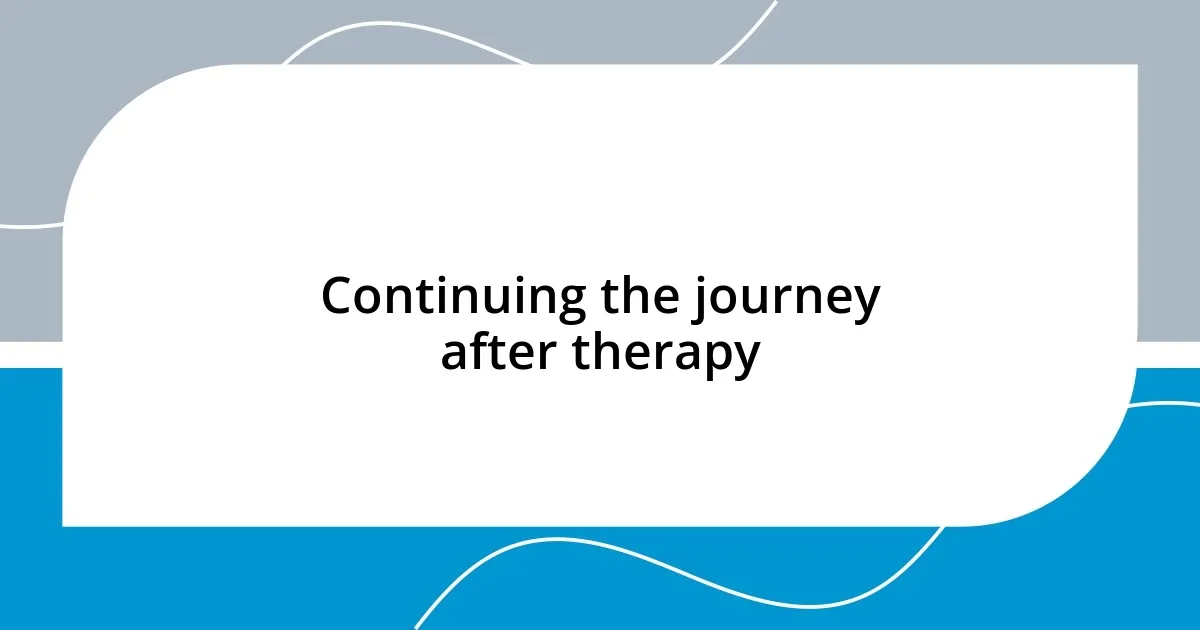
Continuing the journey after therapy
Continuing my journey after therapy felt like stepping onto a bridge—one foot on the solid ground of my past experiences and the other reaching into the unknown future. I distinctly remember a day when I put pen to paper, mapping out intentional steps to incorporate the lessons I had learned. It was empowering to visualize my goals, and I realized that therapy had equipped me with tools that were meant to be used, not shelved. Have you ever felt the urge to take action after a breakthrough moment? That drive can propel you forward.
I also learned that self-care became a vital practice beyond the confines of therapy sessions. One evening, I tried a new meditation technique that had been suggested to me, and it was amazing how a few quiet moments could center my racing thoughts. The emotional clarity I experienced that night reminded me that maintaining mental health isn’t a one-time event; it’s an ongoing commitment. Why do you think so many people overlook simple practices like this? For me, it became a cornerstone of my everyday routine.
As I ventured further along this path, I found immense value in integrating self-reflection into my daily life. Journaling became a cherished ritual. I vividly recall a week when I poured out my feelings on paper, unearthing layers of joy and sadness that I hadn’t acknowledged. Those writing sessions provided me with insights I didn’t expect, like recurring themes of gratitude and resilience. Have you ever discovered something surprising about yourself through writing? For me, it was a powerful reminder that growth truly doesn’t end after therapy; it evolves and expands with every turn of the page.










